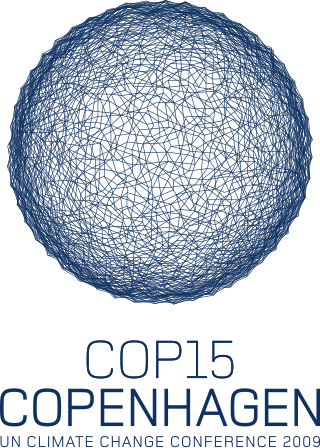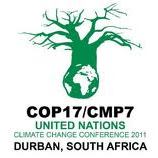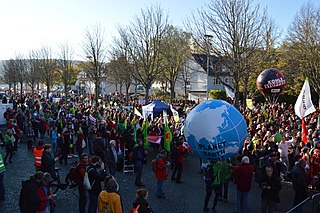The United Nations Framework Convention on Climate Change (UNFCCC) is an international treaty among countries to combat "dangerous human interference with the climate system", in part by stabilizing greenhouse gas concentrations in the atmosphere. It was signed in 1992 by 154 states at the United Nations Conference on Environment and Development (UNCED), informally known as the Earth Summit, held in Rio de Janeiro. Its secretariat was in Geneva at first but relocated to Bonn in 1996. The treaty entered into force on 21 March 1994. "UNFCCC" is also the name of the Secretariat charged with supporting the operation of the convention, with offices on the UN Campus in Bonn, Germany.
Post-Kyoto negotiations refers to high level talks attempting to address global warming by limiting greenhouse gas emissions. Generally part of the United Nations Framework Convention on Climate Change (UNFCCC), these talks concern the period after the first "commitment period" of the Kyoto Protocol, which expired at the end of 2012. Negotiations have been mandated by the adoption of the Bali Road Map and Decision 1/CP.13.
After the 2007 United Nations Climate Change Conference held on the island of Bali in Indonesia in December 2007, the participating nations adopted the Bali Road Map as a two-year process working towards finalizing a binding agreement at the 2009 United Nations Climate Change Conference in Copenhagen, Denmark. The conference encompassed meetings of several bodies, including the 13th session of the Conference of the Parties to the United Nations Framework Convention on Climate Change and the third session of the Conference of the Parties serving as the meeting of the Parties to the Kyoto Protocol.

The 2009 United Nations Climate Change Conference, commonly known as the Copenhagen Summit, was held at the Bella Center in Copenhagen, Denmark, between 7 and 18 December. The conference included the 15th session of the Conference of the Parties to the United Nations Framework Convention on Climate Change (UNFCCC) and the 5th session of the Conference of the Parties serving as the Meeting of the Parties to the Kyoto Protocol. According to the Bali Road Map, a framework for climate change mitigation beyond 2012 was to be agreed there.

The 2008 United Nations Climate Change Conference took place at PIF Congress Centre, Poznań International Fair (PIF), in Poznań, Poland, between December 1 and December 12, 2008. Representatives from over 180 countries attended along with observers from intergovernmental and nongovernmental organizations.
The Indian Youth Climate Network (IYCN) is a youth organization in India that aims to raise the voice of Indian youth on the global platform, as South Asia is one of the most vulnerable regions affected by climate change and environmental issues. Further, IYCN is motivated by global need in the Indian context to adopt mitigation and adaptation policy measure to combat climate change. It is part of the International Youth Climate Movement, which has the same acronym of IYCM.
The UK Youth Climate Coalition (UKYCC) is a non-profit youth organisation in the United Kingdom. It is part of The Climate Coalition in the UK

The Youth Climate Movement (YouNGO) or International Youth Climate Movement (IYCM) refers to an international network of youth organisations that collectively aims to inspire, empower and mobilise a generational movement of young people to take positive action on climate change.
Climate Justice Now! (CJN!) is a global coalition of networks and organizations campaigning for climate justice.

The 2010 United Nations Climate Change Conference was held in Cancún, Mexico, from 29 November to 10 December 2010. The conference is officially referred to as the 16th session of the Conference of the Parties (COP 16) to the United Nations Framework Convention on Climate Change (UNFCCC) and the 6th session of the Conference of the Parties serving as the meeting of the Parties (CMP 6) to the Kyoto Protocol. In addition, the two permanent subsidiary bodies of the UNFCCC — the Subsidiary Body for Scientific and Technological Advice (SBSTA) and the Subsidiary Body for Implementation (SBI) — held their 33rd sessions. The 2009 United Nations Climate Change Conference extended the mandates of the two temporary subsidiary bodies, the Ad Hoc Working Group on Further Commitments for Annex I Parties under the Kyoto Protocol (AWG-KP) and the Ad Hoc Working Group on Long-term Cooperative Action under the Convention (AWG-LCA), and they met as well.

Karen Christiana Figueres Olsen is a Costa Rican diplomat who has led national, international and multilateral policy negotiations. She was appointed Executive Secretary of the UN Framework Convention on Climate Change (UNFCCC) in July 2010, six months after the failed COP15 in Copenhagen. During the next six years she worked to rebuild the global climate change negotiating process, leading to the 2015 Paris Agreement, widely recognized as a historic achievement.
Friends of the Earth Europe (FoEE) is the European branch of the world's largest grassroots environmental network, Friends of the Earth International (FOEI). It includes 33 national organizations and thousands of local groups.

The 2011 United Nations Climate Change Conference (COP17) was held in Durban, South Africa, from 28 November to 11 December 2011 to establish a new treaty to limit carbon emissions.

The Green Climate Fund (GCF) is a fund established within the framework of the United Nations Framework Convention on Climate Change as an operating entity of the Financial Mechanism to assist developing countries in adaptation and mitigation practices to counter climate change. The GCF is based in Incheon, South Korea. It is governed by a Board of 24 members and supported by a Secretariat.

The 2012 United Nations Climate Change Conference was the 18th yearly session of the Conference of the Parties (COP) to the 1992 United Nations Framework Convention on Climate Change (UNFCCC) and the 8th session of the Meeting of the Parties (CMP) to the 1997 Kyoto Protocol. The conference took place from Monday 26 November to Saturday 8 December 2012, at the Qatar National Convention Centre in Doha.

The United Nations Climate Change Conference, COP19 or CMP9 was held in Warsaw, Poland from 11 to 23 November 2013. This is the 19th yearly session of the Conference of the Parties to the 1992 United Nations Framework Convention on Climate Change (UNFCCC) and the 9th session of the Meeting of the Parties to the 1997 Kyoto Protocol. The conference delegates continue the negotiations towards a global climate agreement. UNFCCC's Executive Secretary Christiana Figueres and Poland's Minister of the Environment Marcin Korolec led the negotiations.

The United Nations Climate Change Conferences are yearly conferences held in the framework of the United Nations Framework Convention on Climate Change (UNFCCC). They serve as the formal meeting of the UNFCCC parties – the Conference of the Parties (COP) – to assess progress in dealing with climate change, and beginning in the mid-1990s, to negotiate the Kyoto Protocol to establish legally binding obligations for developed countries to reduce their greenhouse gas emissions. Starting in 2005 the conferences have also served as the "Conference of the Parties Serving as the Meeting of Parties to the Kyoto Protocol" (CMP); also parties to the convention that are not parties to the protocol can participate in protocol-related meetings as observers. From 2011 to 2015 the meetings were used to negotiate the Paris Agreement as part of the Durban platform, which created a general path towards climate action. Any final text of a COP must be agreed by consensus.

The 2017 United Nations Climate Change Conference (COP23) was an international meeting of political leaders, non-state actors and activists to discuss environmental issues. It was held at UN Campus in Bonn, Germany, during 6–17 November 2017. The conference incorporated the 23rd Conference of the Parties to the United Nations Framework Convention on Climate Change (UNFCCC), the thirteenth meeting of the parties for the Kyoto Protocol (CMP13), and the second session of the first meeting of the parties for the Paris Agreement.
Article 6 of the Paris Agreement on climate change enables Parties to cooperate in implementing their nationally determined contributions (NDCs). Among other things, this means that emission reductions can be transferred between countries and counted towards NDCs. Agreement on the provisions of Article 6 was reached after intensive negotiations lasting several years.

Neeshad V. Shafi is a Qatar-based climate advocate and environmental activist. He is the co-founder of the Arab Youth Climate Movement Qatar, a movement working on creating climate change awareness and policies in Qatar. Neeshad's work includes mainstreaming climate change issues, youth advocacy and grassroots work in Qatar. He is currently the executive director at the Arab Youth Climate Movement Qatar and also a Non-Resident Fellow at Middle East Institute (MEI).












